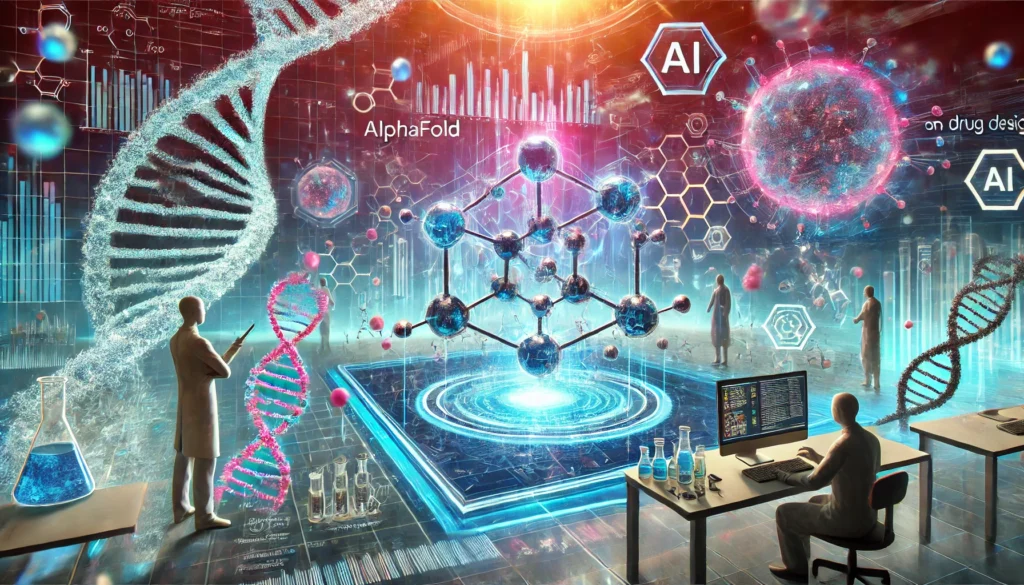
Imagine spending years, maybe even an entire PhD, solving just one piece of a puzzle—the structure of a single protein. For decades, this was the painstaking reality for scientists in labs worldwide. Then, enter AI, specifically AlphaFold, and suddenly, what used to take years can now be approximated in seconds.
This seismic shift in scientific discovery not only recently earned AlphaFold’s creators a Nobel Prize in Chemistry but has also sparked a paradigm shift in how we approach everything from biology to drug design. Welcome to the new frontier of AI-driven science.
How AI Cracked a 50-Year-Old Problem
Back in the early 2010s, a neural network was just another tech buzzword. At the same time, a quiet revolution was brewing in the world of protein folding—a notoriously complex challenge. Proteins, the building blocks of life, derive their function from their 3D structures. But determining these structures experimentally was labor-intensive and slow.
Fast-forward to 2020, and DeepMind’s AlphaFold forever changed the game. Using neural networks, AlphaFold accurately predicted protein structures with unprecedented speed and accuracy. In just a few years, it filled in gaps in our “protein universe,” saving humanity an estimated billion years of research time. Yes, you read that right—a billion years of cumulative effort.
From Protein Folding to Precision Drug Design
AlphaFold wasn’t just a breakthrough for academia—it laid the groundwork for practical applications like drug discovery. Here’s how:
1. Understanding Molecular Machines
Proteins rarely work alone. They’re part of larger molecular machines, interacting with DNA, RNA, and other biomolecules. For example, in cancer research, scientists focus on proteins that repair DNA. Disrupting these repair mechanisms in cancer cells can make them vulnerable, leading to potential treatments.
2. Designing Custom Drugs
AI now enables the rapid design of molecules that interact with these proteins. For example, a drug might “glue” a DNA-repair protein shut, stopping cancer cells from repairing themselves. Traditionally, designing such molecules required months of lab work per iteration. With AI, this process now takes seconds.
3. Personalizing Treatments
Every cancer patient is unique, with different protein mutations. Imagine AI systems creating tailored drugs for each individual patient. While this vision is still on the horizon, researchers are already using AI to simulate protein mutations and design molecules that can adapt in real time.
The Secret Sauce Behind AI’s Success
Neural Network Architectures
Neural networks, once limited to processing images or text, now handle the complex 3D interactions of molecules. Innovations like transformer-based models and diffusion systems (the same tech behind AI art tools) are the backbone of breakthroughs in biology.
Compute Power
Exponential growth in GPU capabilities—dubbed “Jensen’s Law” after Nvidia’s CEO—has made it feasible to train these colossal models. This computational muscle powers everything from AlphaFold to drug-designing agents.
Endless Data
AI thrives on data, and biology offers no shortage. From genomic sequences to protein structures, each dataset feeds richer models, enabling even greater discoveries.
What’s Next? Beyond Proteins and Pills
The success of AlphaFold is just the beginning. The same AI-driven approach is being applied to:
- Material Science: Designing stronger, lighter, and more sustainable materials.
- Energy Solutions: Innovating better batteries and energy storage.
- Chemistry: Discovering new compounds for industrial and medical use.
By creating AI “analogs” of the real world, scientists can simulate experiments on a massive scale, accelerating progress across multiple fields.
Why This Matters for Humanity
Drug development is facing a crisis. Eroom’s Law (the inverse of Moore’s Law) describes the declining efficiency of pharmaceutical R&D—it’s becoming exponentially more expensive to develop new drugs. AI offers a way out, reversing this trend by drastically reducing costs and timelines.
Imagine the possibilities:
- Faster treatments for rare diseases.
- Affordable drugs for global health challenges.
- Custom-tailored therapies for individuals.
This isn’t just about curing disease; it’s about empowering humanity to tackle its most pressing challenges with unprecedented precision.
How You Can Join the AI Science Revolution
The future of AI-driven science isn’t limited to elite labs. As this paradigm grows, opportunities will arise for machine learning enthusiasts, bioinformatics experts, and innovators across disciplines. If you’re in tech, now is the time to explore how your skills could contribute to this wave of discovery.
Key Takeaways
- AlphaFold has redefined protein research, saving humanity a billion years of effort.
- AI is accelerating drug discovery, from molecule design to personalized medicine.
- This new AI paradigm is transforming fields beyond biology, paving the way for global innovation.
Sharing is Caring
Love this post? Share it to inspire others about the incredible power of AI in science! 🌟
Hashtags: #AIRevolution #AlphaFold #DrugDiscovery #FutureOfScience #DeepTech
Let’s unleash the power of AI to solve humanity’s greatest challenges. What do you think—can AI change the world? Drop your thoughts in the comments!
